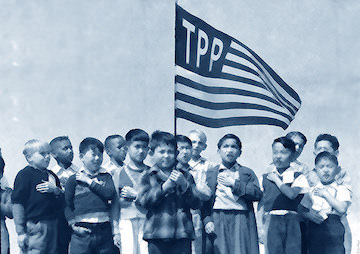Ambiguity and Distrust Reign as the Trans-Pacific Partnership Is Published
It’s difficult to tell what the text of the Trans-Pacific Partnership, which was put online Thursday, actually says. DonkeyHotey / CC BY 2.0
DonkeyHotey / CC BY 2.0
It’s difficult to tell what the text of the Trans-Pacific Partnership, which the New Zealand government put online Thursday, says.
As The Guardian observed in its report on the release, the most serious critique of the world’s largest “free trade” deal, which representatives of nations and business have negotiated in secret for years, has long been that it would allow “multinational companies to challenge laws and regulations in private tribunals on the grounds they amount to unfair barriers to trade.”
But as The Guardian also noted, the deal apparently “includes safeguards against abusive claims and guarantees governments the right to enforce health, labor, safety and environmental regulations in the public interest.”
It is impossible for lay people and many journalists to tell whether these “safeguards” are sufficient to protect the public interest. Even veteran lawyers cannot predict with absolute certainty how judges will rule when a case descends into the minutiae of loopholes written in legalese. Given that corporate lawyers wrote much of the deal, the public has every reason to distrust it regardless of what advocates say.
As things stand, talking heads in government, the business community, media and public advocacy groups disagree over how the deal would affect individual nations and global society.
Some observations from The Guardian are:
Under a trade law passed earlier this year, Barack Obama must give the public time to review the text before he signs the agreement and turns it over to Congress for approval. Lawmakers cannot nitpick the deal with amendments. They must simply vote yes or no. Congress is likely to take up the issue next year in the heat of the presidential election campaign. …
The White House says the deal eliminates more than 18,000 taxes that countries impose on US exports. The agreement also calls for labor protections such as ensuring that workers in member countries have the right to form unions. …
Those opposed to the deal contend it will force American workers to compete even more directly than they do now with workers in low-wage countries such as Vietnam.
They also complain that the agreement goes beyond traditional trade issues such as tariffs and import quotas and includes giveaways to powerful business lobbies.
The input from big businesses, such as pharmaceutical companies, recording studios, agribusinesses and other multinationals is evident in the myriad details laid out in the document. But negotiators reflected an awareness of those concerns with meticulous references to the rights of each country to protect its own sovereign powers and best interests.
— Posted by Alexander Reed Kelly.
Your support matters…Independent journalism is under threat and overshadowed by heavily funded mainstream media.
You can help level the playing field. Become a member.
Your tax-deductible contribution keeps us digging beneath the headlines to give you thought-provoking, investigative reporting and analysis that unearths what's really happening- without compromise.
Give today to support our courageous, independent journalists.






You need to be a supporter to comment.
There are currently no responses to this article.
Be the first to respond.